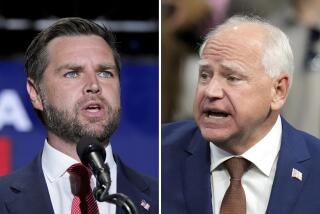At Davos Forum, Every Topic Is Fair Game for Bill Clinton
DAVOS, Switzerland — Taking center stage at the World Economic Forum, former President Clinton delivered a virtuoso performance Thursday with a discussion of everything from Mideast crises to his past as president and future as a global activist.
Clinton was clearly in his element in the high-powered annual talkfest that is Davos. He won a standing ovation from a rapt audience of political, business and cultural leaders.
Clinton’s focus during meetings here was on AIDS, poverty and Africa, issues on which he and his nonprofit foundation concentrate. But the evening conversation with talk show host Charlie Rose showcased Clinton’s intellect, eloquence and occasional slipperiness on an array of issues. His long legs crossed at the ankles, he riffed like a jazz musician, sliding easily among topics and moods, alternately cerebral, wry and humorous.
Clinton gave opinions about President Bush, his political and personal antithesis in many ways.
“I don’t agree with the administration’s policy on the budget, on the environment and a whole host of other issues and I have articulated them,” Clinton said. But he added: “I do confess, I like President Bush personally. He’s different from me in a lot of ways” -- there was laughter from the audience -- “I mean psychologically. But we grew up in the same part of the world and I get him.”
Clinton questioned the idea that Bush’s reelection was an endorsement of his Iraq policy. Instead, Clinton said, Bush won because undecided voters were swayed by his aggressive initial response to the Sept. 11 attacks and success in preventing new terrorist strikes.
The future of Iraq hinges on the attitude of the victors in Sunday’s election, Clinton said. Especially if violence suppresses voter turnout in Sunni strongholds, the majority Shiites and Kurds should be magnanimous to Sunnis and draft a constitution that fairly represents them, he said.
While reiterating that the U.S. should have let U.N. inspectors finish their work before invading Iraq, the former president said Bush should refrain from withdrawing troops too soon and speed up training of security forces with European help.
“We ought to accept the offer of any competent country that can help us train more security people more quickly because we have to increase the capacity of the Iraqis to defend themselves,” Clinton said. “We need to get out of there, but we don’t need a timetable.... We’ve got to stay there and do the job, but if we stay there too long, a certain percent of the people will believe we are there for the oil or for imperialist reasons and not try to make the deal work.”
Clinton urged restraint in dealing with Iran over its nuclear program and said British, French and German negotiators deserve a chance to work out a diplomatic solution.
He called Iran a far more formidable foe than Saddam Hussein’s Iraq and a “perplexing” country split between “two governments”: a hard-core minority that controls security forces and a reformist, pro-Western majority. A hasty and bloody military strike might alienate that majority, he said.
“We ought not to do any [military action] until we have exhausted all reasonable diplomatic efforts,” Clinton said, describing the main danger of a nuclear Iran as the potential transfer of nuclear materials to terrorists.
“Deterrence still works, just like it did between us and the Soviet Union. So if Iran had a nuclear weapon, the main thing it would do is cast a pall over the Middle East. But they’d have to think a long time before they used it, because they’d be toast if they used it.”
Clinton indulged in self-deprecating humor, saying with a chuckle: “Keep in mind I haven’t seen any intelligence in four years. Some people think I didn’t see any before. Or they think I didn’t have the intelligence to understand the intelligence.”
But the tone turned personal and emotional as Clinton reminisced about tough moments of his presidency: the assassination of his friend, Israeli Prime Minister Yitzhak Rabin; the subsequent eleventh-hour failure of an Israeli-Palestinian peace effort during his second term and the realization in hindsight that he could have saved hundreds of thousands of lives by ordering military intervention during Rwanda’s 1994 genocide.
He said his future goals were based on the reality that the world had become interdependent. The results have been both ominous, such as the rise of terrorism, and hopeful, such as the large number of private donations to tsunami victims in Asia, a crisis in which he and former President George H.W. Bush are leading the U.S. response.
“I should do whatever I can to help to create an integrated global community where we have shared benefits and shared responsibilities and we don’t fight because of our differences,” Clinton said.
“I just wake up every day saying, ‘How lucky did I get, right?’ And so my goal is, I just don’t want anybody younger than me to die before they have to. To have their dreams broken.... So I just want to spend the rest of my life doing what I can to stop that from happening.”
More to Read
Sign up for Essential California
The most important California stories and recommendations in your inbox every morning.
You may occasionally receive promotional content from the Los Angeles Times.










